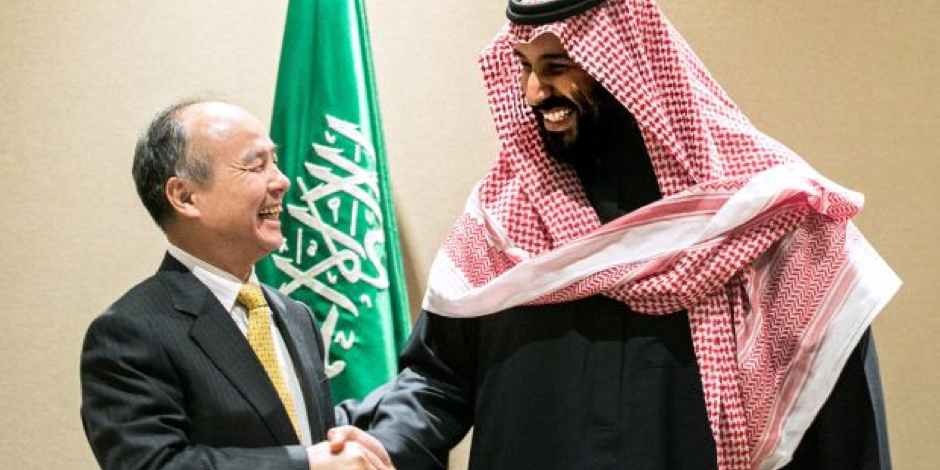The annual Future Investment Initiative conference, dubbed ‘Davos in the desert’, was meant to be a
glowing example of Saudi Arabia’s growing importance in the world. But this year, it was
overshadowed by the Khashoggi killing, the region’s worst diplomatic crisis since 9/11. This
prompted drop-outs from guests such as Jamie Dimon, CEO of JP Morgan Chase, Blackstone CEO
Stephen Schwarzman, and a plethora of other companies and prominent individuals. However,
where was the CEO of Softbank? Masayoshi Son’s response was a lot more subdued, whilst he did
cancel a speech, his comments were noticed- first he condemned the killings, but ultimately pledged
his intention to continue his commitments with the Crown Prince (MBS) and the Public International
Fund (PIF).
MBS’s ambition of ‘Saudi Vision 2030’ emphasises the kingdom’s aim to diversify its economy away
from its reliance on oil, and invest more in the public sector. Masayoshi Son is the CEO of Softbank,
the Japanese technological conglomerate that has played a big part in this plan. It commands the
world’s largest technology investment vehicle, labelled the ‘Vision Fund’, valued at nearly $100
Billion, with almost half financed by the Public International Fund – Saudi Arabia’s sovereign wealth
fund. But, in the midst of the Kashoggi affair, what does the future hold for the fund? This article will
focus on the threats this ongoing diplomatic crisis brings and contextualise it among other threats,
and more importantly explores if and how SoftBank can overcome these.
The most notable impact was the 22% drop in Softbank shares, once the Khashoggi story broke.
However, recent second quarter results showed profits of 706 billion yen ($6.2 billion), a fivefold
increase, blowing forecasts out of the water. And more good news was apparent in the fact that the
Vision Fund has secured more money from Riyadh. Does this mean the worst has already passed?
There seems to still be concern about the future of the Vision Fund. Its technology-focused portfolio
is severely exposed to the general sell-off we are seeing within FAANG/NASDAQ markets. Whilst the
investment in India’s largest online retailer Flipkart paid off, yielding a profit of $1.5 Billion, scrutiny
must be afforded to its other investments.
Dara Khosrowshahi, CEO of Uber, was one of the CEO’s who dropped out of the conference. This
significant because both the Vision fund and PIF have invested in the ridehailing firm, with Softbank
being their biggest investor. Uber is facing existential challenges, from regulatory hurdles in cities
like London, questioning the ethics of the ‘gig-economy’, or backlash from the #MeToo movement,
which led to the removal of Travis Kalanick as CEO. On top of all this, there is increased competition
from the likes of Lyft. All these factors contributed to the company posting a loss of more than $1bn
this quarter. Further pitfalls can be seen in the Vision Funds investment in Wework, the serviced
office group, whose losses have spiralled to $1.2 Billion since the start of 2018.
Nevertheless, whilst these investments seem to be underperforming, the prospect of growth is key
in the context of tech companies. Uber’s plan to complete their IPO in 2019 is exciting, and whilst
this may coincide with Lyft’s IPO, the listing could value Uber at $120 Billion. An attainable target,
considering there is rapid revenue growth. Furthermore, Softbank’s $2.5 Billion investment in Ola,
who some have called ‘India’s answer to Uber’, demonstrates the fund’s ability to hedge against
such perceived exposure. This constant appetite for ride-hailing companies can be seen in
investments in China’s Didi Chuxing, and south-east Asian firm Grab. Another notable sector is the
growing market for autonomous vehicles, which is becoming a big part of the automobile industry.
Softbank secured a partnership with Toyota, agreeing to develop a fleet of self-driving vehicles and
has invested in Cruise, General Motor’s self-driving vehicle unit. This shows that Softbank’s
investments, whilst exposed to short-term losses, are likely to come into fruition in the future.
A more poignant issue, which demands attention, is the company’s plan to list its domestic mobile
unit, the IPO of Softbank Mobile, valued at $21 Billion. Softbank Mobile or Softbank Corp, origins are
in 2006, when Mr. Son bought Vodafone’s Japan operation. At first, his new proposal might raise
concern because this division has been seen as Softbank’s ‘cash-cow’. But deeper analysis reveals
that Softbank will retain a stake of 66% and more importantly, spinning off the telecoms division will
signify a strategic shift in the company. It will start an era of greater focus on its technological
venture fund. The IPO has been valued at a hefty premium, nearing the unprecedented IPO of
Alibaba ($25 Billion) – this will effectively inject more cash into the Vision Fund, allowing it to make
more investments.
Mr. Son has also wetted the appetites of analysts with the prospect of raising a second Vision Fund.
Dubbed ‘Vision Fund II’. Many feel that the crisis around Saudi Arabia has stalled plans of its launch.
But that aside, the Vision Fund II has already received backing from the sovereign wealth funds of
Saudi Arabia and Abu Dhabi. Whilst, the timeline for launch is uncertain, it reveals that the ‘Unicorn
Hunter’ is not done hunting.
References:
Isabella Steger. 2018. ‘SoftBank is staying put as more names pull out of “Davos in the Desert”’
[Quartz] – https://qz.com/1431547/softbanks-masayoshi-son-committed-to-saudi-davos-in-the-
desert/
Kana Inagaki.2018. ‘SoftBank reaffirms investment ties with Saudi Arabia’ [Financial Times] –
https://www.ft.com/content/a116c26c-e0c6-11e8-a6e5-792428919cee
Brett Kenwell.2018. ‘Will Uber's Recent Numbers Support Its IPO Valuation?’ [The Street]-
https://www.thestreet.com/markets/ipos/do-uber-recent-numbers-support-its-ipo-valuation–
14783564
Market Watch. 2018 ‘Softbank Group Corp.’ –
https://www.marketwatch.com/investing/stock/9984?countrycode=jp
Zahraa Alkhalisi. 2018 ‘SoftBank's Masayoshi Son is skipping the Saudi summit altogether’ [CNN
Business]- https://edition.cnn.com/2018/10/23/business/saudi-conference-masayoshi-
son/index.html






